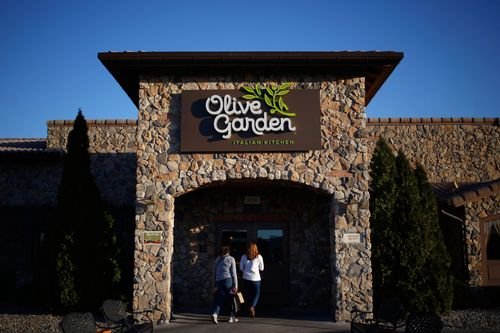Restaurants like Olive Garden and Applebee’s were in trouble even before the pandemic

If you grew up in the 1990s, you might remember a trip to Olive Garden or Applebee’s as the highlight of your week.
Those days are gone. Over the years, casual dining chains — known for table service, atmospheric dining rooms and long menus — lost their luster. And now, many are fighting for survival.
Sizzler USA and Ruby Tuesday are among the many restaurants that have filed for bankruptcy during the pandemic. The Cheesecake Factory told its landlords in March that it wouldn’t be able to pay April rent at its 300 locations. (The company declined to provide an update on whether it has resumed rent payments.)
Even major players like Olive Garden, Chili’s and Applebee’s have reported plunging sales in their most recent quarterly results.
Overall, sales at casual dining chains fell by nearly 21% in 2020, according Black Box Intelligence, a data company that collects information from its restaurant industry clients. The broader industry, which includes fine dining, fast food and other types of restaurants, suffered a more modest sales decline of about 17%.
Capacity limits on indoor dining have been a massive blow. Most casual dining chains don’t have drive-thrus. Before the pandemic, they didn’t offer or prioritize delivery. So when officials ordered restaurants to close their doors, sales dropped.
Analysts predict that eventually, people will want to dine out again and return to casual dining restaurants. But when they do, they may find a different landscape: fewer players overall, with the sector’s biggest chains getting stronger, and smaller chains and independent restaurants within the category losing out.
The writing on the wall
The casual dining industry has been on shaky ground since the 2008 financial crisis, when many customers found the option too expensive — an Olive Garden entree can run about $20. Instead, they started visiting fast casual brands like Chipotle and Panera, which were more affordable and perceived as serving higher-quality food than fast food restaurants.
“The recession really became sort of the accelerator of the fast casual industry,” said Sam Oches, editor of QSR magazine. “That really took the wind out of the sales of casual.”
A few years later, casual dining restaurants faced a new challenge: Third-party delivery services like DoorDash and Grubhub, which were starting to gain traction, encouraged more consumers to order in rather than go out to eat.
Casual dining chains, which have long advertised their restaurants as a place to visit and stay a while, were especially slow to join such services, which charge a commission that eats into profits.
Because of the lack of a meaningful delivery option and competition from fast casual brands, interest in casual dining started to fade.
“That segment of the restaurant landscape has essentially been in decline for the past 13, 14 years,” said Peter Saleh, restaurant analyst at BTIG. “It’s lost traffic almost every single year over that time.”
Meanwhile, costs have kept up.
“Think about a Cheesecake Factory. You’re talking about a 10,000-square-foot box,” Oches said. “You’re talking about many dozens of employees per restaurant, your labor costs are crazy. You’re talking about several pages of a menu, so your food costs are crazy,” he said. “Profit margins for these restaurants are very slim.”
He said that “the writing was already on the wall before Covid that this was not really going to be a model of the future.”
The big get bigger, the small go out of business
Following the pandemic, casual dining restaurants could look different. Powerful brands will be stronger than they were before, according to industry analysts. And many local restaurants or small chains, which lack the resources larger rivals have, will go out of business.
Darden, which owns chains like Olive Garden and Longhorn Steakhouse, should be in a particularly good spot when the pandemic ends, said Nicole Miller Regan, senior research analyst at Piper Sandler.
“They will dominate in terms of market share because they have the biggest footprint,” she said. With over 1,800 locations, “they’re everywhere that a store closes,” she said. “They’re well positioned, just from literally being there … to pick up that share.”
The restaurant chains that survive may open smaller locations that cater to pickup and delivery orders, said Melissa Wilson, principal at the market research firm Technomic. P.F. Chang’s, for example, opened a to-go location in Chicago in February, and expanded the concept into New York last year.
Meanwhile, one restaurant is trying out a new model: An Applebee’s in Texarkana, Texas, will be the first US Applebee’s to have a drive-thru pickup window when construction wraps up this year. Applebee’s will see how the drive-thru performs “to determine whether pick-up windows should be included in future building design packages,” Scott Gladstone, vice president of strategy, said in an email.
And to boost sales and test out other ways to reach people at home, some restaurant operators are experimenting with new brands that are available online only.
Last year, Brinker International, the owner of Chili’s and Italian chain Maggiano’s, launched a site called It’s Just Wings where customers can order from a limited menu and have their food delivered via DoorDash. The items are prepared at Chili’s and Maggiano’s restaurants.
Dine Brands, which owns Applebee’s, has launched a similar concept called Neighborhood Wings by Applebee’s.
Others that cut down long menus for efficiency during the pandemic are unlikely to go back. Darden cut back menu items during the pandemic, slimming down offerings by up to 40% per brand.
During a December earnings call, Darden CEO Eugene Lee said that a smaller menu required discipline. “We haven’t demonstrated that as an industry over the last 15 years, and we need to demonstrate that moving forward,” he said.
CNN’s Jordan Valinsky contributed to this report.